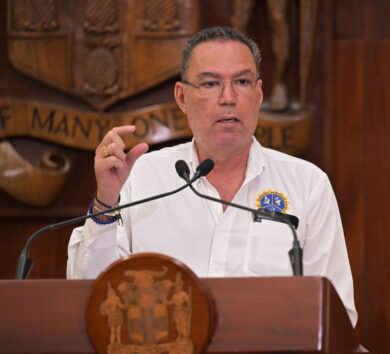

Minister of Science, Energy, Telecommunications and Transport Dayl Vaz announced that motorists will be able to license their vehicles for up to two years while outlining that the government will overhaul the use of demonstration plates.
Vaz outlined that after Prime Minister Andrew Holness’s 2025 budget presentation on March 27 about new changes being implemented to the certificate of fitness programme, a multi-agency team led by the Ministry of Transport met shortly after to determine the steps and actions to be taken to implement the policy change.
Additionally, he said provisions are being made for motorists to license their vehicles for up to two years at a time. “The team is working on a technology solution to integrate the fitness and registration systems, enabling the Jamaica Constabulary Force (JCF) to access all necessary vehicle information via the license plate. This will require amendments to the road traffic regulations to give effect to these changes. The projected implementation time for this is within the next two to three months, between June and July, and is what I have mandated my permanent secretary,” Vaz said.
He expressed that it is important to clarify that contrary to some media and social media reports, the policy position announced by the prime minister does not currently exist in the legislation. “Existing provisions allow six months for commercial vehicles and a maximum of two years for all other vehicles. Let me, again, for clarity, state that there will be no fee increase in this policy change. So, the extension of the time for your registration and your certificate of fitness will not come at an additional cost.
Vaz also said that there will be three classifications rather than what exists now for motorists to pay for their certification of fitness fee. “Currently, legislation allows up to two years. For the new policy, new vehicles will be up for five years. So from your purchase and new vehicle, your fitness will be allowed for five years. In relation to three-year-old cars, less those will be for three years. Anything over three years old will be up to two years. So there will be three classifications rather than what obtains now, which, as we know, is quite tedious.”
He also noted that this initiative will be heavily driven by technology. “So the days of the stickers on your car and the paper certificate of fitness and all those with it are a thing of the past. We’re going to use this opportunity now since there are some legislative changes to just do everything at one time. That would include getting a driver’s licence, where you go to the depot, and depending on what methodology you wish to use, it is how fast you get through.
“We’re moving to a system where you can make an appointment online, and only people with appointments at the scheduled time will be allowed into the exam centre. This will help avoid long waits, whether it’s minutes, hours, or days, depending on whom you talk to. For those of us with young children or teenagers getting their driver’s licence, you know how this process works. The goal is that when you visit the exam centre, you’ll only interact with the staff there and not those that are outside on the periphery hustling you to give you the service that you would rather have than should give you automatically,” he continued.
Demonstration plates issue of concern
Vaz further outlined that another great issue of concern is the use of demonstration plates, which is a national security concern. “Those are the blue plates. You’ll have seen on social media a terrible accident involving a Mercedes Benz coming from a party, killing four people who had DC plates.
“DC plates are used for the automobile trade in relation to moving cars from the wharf, demonstrating the cars for sale, etc. So there’s a growing concern about the widespread misuse of demonstration plates in Jamaica,” he continued.
Vaz said that in many places, these plates are not being used as intended under the Road Traffic Act and associated regulations. “Disturbingly, there is credible evidence that demonstration plates are being exploited by individuals to facilitate criminal activities. Compounding the issue, the police are currently unable to trace these plates through their smart check system.”
Vaz also said that currently, the Tax Administration of Jamaica (TAJ) does not have an accurate count of the demonstration plates currently in circulation. “This gap in oversight has created opportunities for cloning and unauthorised use by criminal elements,” he said.
He expressed that as a result, the government is losing revenue, and the lack of control over the system poses a serious threat to public safety and national security. “ To address these challenges, legislative amendments will be required to overhaul the system and support a more secure, transparent and accountable demonstration plate regime.
“In light of the above observations, the government will embark on a total revamp of the current system and replace it with a web-based demonstrated permit system. Dealers are able to access demonstration plates as required, and authorities are better able to enforce and monitor compliance with little resources,” Vaz continued.
He said the benefits to the government and Jamaicans include an ease in administration management and enforcement, a dealer online application and the ability to specify usage of permits and printed permits, which will have a QR code for enforcement verification. Vaz expressed that the revamp of the demonstration plate process will be at a cost of approximately J $10 million.
“For the design and implementation of the management system, a total recall of existing plates, for which a deadline will be issued; the submission of the legislative changes; and, of course, the finalisation of the new fee structure.”






Comments